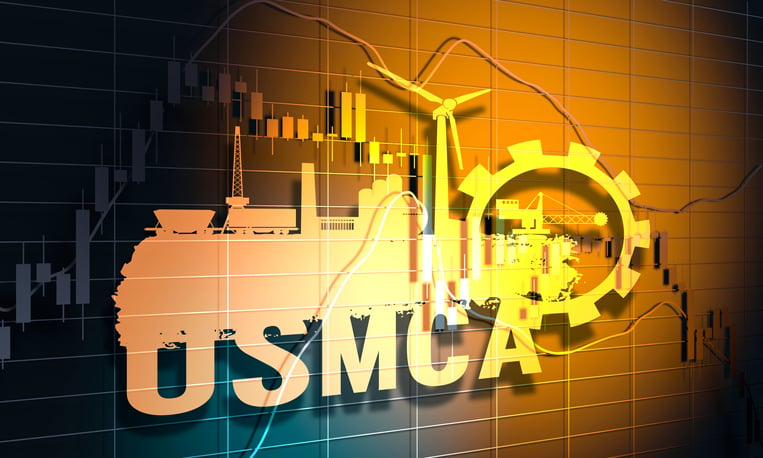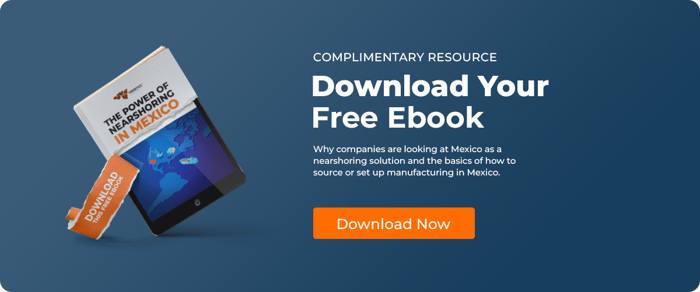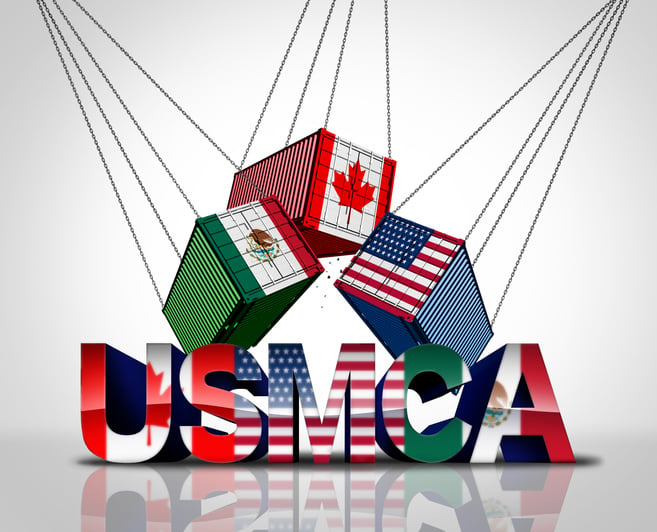Maquiladoras are foreign-owned factories located in Mexico that assemble goods for export to the United States and other countries. These factories play a significant role in the economies of both Mexico and the United States, creating jobs and promoting economic growth in Mexico while providing cheap imports and reducing labor costs for US companies.
With maquiladoras making up 58% of Mexico’s manufacturing GDP and nearly half of industrial jobs in recent years, their impact is hard to ignore. Keep reading to discover how these factories drive economic growth and strengthen ties between Mexico and the United States.
Economic Impact and Interdependence Through Maquiladoras
Mexico's manufacturing industry has surged as businesses shift production from China, drawn by lower costs, skilled labor, and accessible resources. For companies aiming to expand, maquiladoras offer significant advantages:
- Tariff exemptions
- Lower production costs
- Improved product quality
These foreign-owned factories not only bolster the Mexican economy but also serve as essential links in global supply chains, especially for the United States. By relying on Mexico for production, US companies strengthen their supply chains and boost productivity. In return, Mexico benefits from foreign investment, job creation, and enhanced economic growth.
Trade Agreements Supporting Maquiladoras
International trade agreements like NAFTA (1993) and its successor, USMCA (2018), have laid the groundwork for maquiladora growth by fostering cooperation among the United States, Mexico, and Canada. Key outcomes of these agreements include:
- Reduced tariffs
- Simplified cross-border trade
- Expanded economic opportunities
Through these agreements, maquiladoras have become engines of economic growth, providing new opportunities for the Mexican workforce and driving economic development in the region.
Mutual Benefits of Interconnected Supply Chains
The interconnectedness of maquiladoras creates a mutual dependency that benefits both countries. For the United States, outsourcing production to Mexico enables cost-effective manufacturing and quality improvements. Meanwhile, Mexico gains:
- Foreign investment
- Job opportunities
- Economic advancement
By sharing production responsibilities, the maquiladora model enhances productivity and raises living standards, making it a win-win for both economies.
Maquiladoras Definition
Mexico's maquiladora plants are factories located in Mexico that assemble, process, or manufacture goods for export, primarily to the United States. These factories take advantage of tax incentives and trade agreements to import raw materials duty-free and export finished goods with reduced tariffs. Maquiladoras play a significant role in the Mexican economy by providing jobs and economic growth.
Where Are Maquiladoras Located?
Maquiladoras are typically located in the northern border regions of Mexico, near the United States. This proximity allows them to take advantage of the close trade and transportation links between the two countries. Some of the most important maquiladora factory hubs in Mexico include Ciudad Juarez, Tijuana, Reynosa, and Matamoros. These cities have developed large maquiladora industries, employing hundreds of thousands of workers and contributing significantly to the local and national economies.
History of Mexican Maquiladoras
Maquiladoras are factories in Mexico that assemble, process, or manufacture goods specifically for export. The term "maquiladora" is derived from the Spanish word "maquilar," meaning to assemble or process. These factories have long been a cornerstone of Mexico-US trade relations, representing a key aspect of cross-border commerce.
Origins and Growth
The establishment of maquiladoras traces back to the Mexican-American Border Industrialization Program of 1965. This program had two main goals:
- Promote economic growth in the border regions of Mexico and the United States
- Boost employment by allowing Mexican factories to import raw materials duty-free and export finished goods with reduced tariffs
Since then, maquiladoras in northern Mexico have evolved into a major source of employment and economic growth.
Impact and Controversy
While maquiladoras have created jobs and supported economic growth, they are also sources of debate. Some view these factories as opportunities for income and stability, helping to lift people out of poverty. Others, however, criticize low wages and working conditions. This dual perspective highlights the complex role maquiladoras play in Mexico’s economy.
Government Support and Initiatives
To encourage further development, the Mexican government has introduced initiatives aimed at strengthening maquiladoras, such as:
- Special economic zones offering specific benefits
- Tax incentives to attract more foreign companies
- Infrastructure improvements to support factory operations
These efforts underscore the ongoing importance of maquiladoras in Mexico's economic landscape, as they continue to be integral to both local employment and international trade.
Impact Maquiladoras Have on Mexico and the United States
Maquiladoras have had a significant impact on both Mexico and the United States. The maquiladoras of northern Mexico are a major source of employment and economic growth. This has helped to improve the standard of living for many people and attract foreign investment to the country. However, the working conditions in maquiladoras in Mexico have been criticized, with many employees working long hours for low wages in factories with few labor protections.
In the United States, maquiladoras have been seen as a way for companies to reduce labor costs and remain competitive in global markets. The low cost of production in Mexico has allowed US companies to increase their profits, but it has also been criticized for taking away jobs from American workers and contributing to the decline of the domestic manufacturing industry. Additionally, some argue that the cheap imports from Mexican maquiladoras have hurt the US economy by lowering prices for consumers but also reducing the demand for American-made products.
Overall, maquiladoras have had a complex impact on Mexico and the United States, with both positive and negative effects.
How Maquiladoras Can Be Beneficial for Both Countries Going Forward
Maquiladoras can be beneficial for both Mexico and the United States in several ways in the future:
1. Improved Working Conditions
By addressing the criticism of low wages and poor working conditions in maquiladoras, both Mexico and the United States can improve the standard of living for workers and enhance their quality of life. This can be achieved through stronger labor protections, better wages, and improved health and safety conditions in the factories.
2. Increased Trade
Maquiladoras can help to increase trade between Mexico and the United States, strengthening the economic ties between the two countries. This can help to promote economic growth and create new job opportunities in both countries.
3. Technological Advancements
By promoting investment in new technologies and innovation, maquiladoras in Mexico can help to improve productivity and competitiveness. This can drive economic growth in both Mexico and the United States and help to create new, high-skilled jobs in the manufacturing sector.
4. Strengthened Relations
By working together to address the challenges facing maquiladoras, Mexico and the United States can strengthen their economic and political ties. This can help to promote stability and peace in the region and create a more positive relationship between the two countries.
How do maquiladoras help to connect the world and foster economic activities?
Maquiladoras help connect the world and drive economic activities by enabling foreign companies, often from the United States, to establish manufacturing operations in Mexico. This setup reduces costs, eliminates tariffs, and improves product quality, creating interdependence between nations. By investing in maquiladoras, foreign companies promote local economic growth, generate jobs, and enhance living standards in host countries.
Additionally, maquiladoras foster cross-border resource sharing and expertise, which boosts productivity, efficiency, and innovation. They contribute to complex, multinational supply chains, with various production stages occurring across different countries. This global coordination ensures smooth and efficient production, strengthens economic ties, and facilitates the movement of goods worldwide, promoting a tightly connected international economy.
How do maquiladoras contribute to international cooperation and trade?
Maquiladoras boost international cooperation and trade by allowing foreign companies, particularly from the United States, to set up operations in Mexico, benefiting from lower production costs, tariff exemptions, and quality improvements. This arrangement strengthens supply chains, enhances productivity, and fosters economic ties between countries. In return, foreign investment in maquiladoras creates jobs and improves living standards in Mexico.
Trade agreements like NAFTA (1993) have been pivotal in expanding the maquiladora model, promoting collaboration among the U.S., Mexico, and Canada, and driving economic growth. The maquiladora system creates interdependence, with nations leveraging their resources and expertise to achieve efficient global production. While foreign companies benefit from Mexico's workforce and manufacturing conditions, Mexico gains investment, employment opportunities, and technological progress.
What Trade Agreements Have Facilitated the Growth of Maquiladoras?
Maquiladoras, often hailed as engines of economic growth, owe their success to a combination of factors, including tax incentives and trade agreements. These agreements allow maquiladoras to import raw materials duty-free and export finished goods with reduced tariffs, thus maximizing their profitability. One such trade agreement that has significantly facilitated the growth of maquiladoras is the North American Free Trade Agreement (NAFTA), which came into effect in 1994. NAFTA, a landmark trade deal between the United States, Mexico, and Canada, has played a pivotal role in enhancing cooperation and potential among these nations. In particular, the maquiladora model has witnessed tremendous expansion as a direct consequence of the opportunities and development fostered by NAFTA.
By reducing trade barriers and fostering cross-border trade, NAFTA has created an environment conducive to the growth and prosperity of maquiladoras, ultimately benefiting the Mexican people by providing them with increased economic prospects. Thus, it is through trade agreements like NAFTA that the growth and success of maquiladoras have been made possible, enabling them to harness the advantages of tax incentives and expand their operations on a global scale. The United States-Mexico-Canada Agreement (USMCA) was implemented on July 1, 2020. It replaced the North American Free Trade Agreement (NAFTA) and serves as the trade agreement between the United States, Mexico, and Canada.
What is the relationship between maquiladoras and the modern economy?
Maquiladoras, foreign-owned factories in Mexico, play a vital role in the modern economy by assembling goods for export, especially to the United States. They drive economic growth and job creation in both Mexico and the U.S., contributing to a cooperative economic relationship. Originating from the 1965 Mexican-American Border Industrialization Program, maquiladoras have fostered employment and foreign investment in Mexico, where businesses benefit from a skilled workforce at lower costs. This has made Mexico an attractive alternative to other manufacturing locations, like China.
However, maquiladoras face criticisms regarding working conditions, including low wages and limited labor protections, though their overall impact on Mexico’s economy has been positive. For U.S. companies, maquiladoras provide a means to reduce labor costs and stay competitive, although this can affect American manufacturing jobs, sparking debate. Supported by trade agreements like NAFTA, maquiladoras highlight a cooperative model between Mexico and the U.S., contributing significantly to economic development and cross-border trade.
How Mexican Maquiladoras Can Benefit Your Company
Mexican maquiladoras provide a valuable opportunity to improve your bottom line with access to a skilled workforce, reduced labor costs, and new market potential. Setting up a maquiladora in Mexico can significantly cut production expenses, boost profitability, and benefit from tariff exemptions for smooth trade. The quality of products manufactured in Mexican maquiladoras is high, thanks to a well-established infrastructure and skilled labor, giving you a competitive edge in delivering quality goods.
Additionally, maquiladoras enhance supply chains through their strategic location, close to key markets, which increases productivity and operational efficiency. Investing in maquiladoras also creates job opportunities in Mexico, positively impacting local communities.
How should businesses assess the strategic alignment of maquiladoras with their long-term objectives?
Businesses aiming to leverage maquiladoras must carefully evaluate their compatibility with long-term objectives. Here's how to ensure strategic alignment:
- Supply Chain Integration: Examine how maquiladoras can enhance your supply chain. For many companies, efficiency is key. Consider whether these operations improve logistical networks and reduce costs.
- Global Expansion Goals: Determine whether maquiladoras support your international growth plans. Assess if their location and capabilities provide a competitive edge in new markets.
- Cost-Benefit Analysis: Analyze the financial implications. Do the cost savings from operating in maquiladoras justify potential trade-offs, like customs regulations or changes in quality standards?
- Regulatory Environment: Stay informed about evolving trade policies and labor laws. Evaluate if the regulatory climate in the maquiladora regions remains favorable for sustainable operations.
- Cultural and Operational Synergies: Assess the compatibility of corporate culture and operational procedures. Sharing similar values and workflows can facilitate smoother collaboration and integration.
- Risk Management: Identify risks associated with maquiladora dependency. Consider geopolitical stability, exchange rate fluctuations, and potential disruptions in cross-border operations.
By systematically evaluating these aspects, businesses can make informed decisions on whether maquiladoras align with their broader strategic vision.
Efficient and Reliable Transportation from Maquiladoras to the U.S. With Visigistics
Understanding the Need for Expert Logistics Transporting goods from a maquiladora to the United States requires not just any logistics provider, but a team that specializes in this specific trade corridor. The efficiency and reliability of your logistics partner directly affect the cost-effectiveness and time management of your cross-border operations.
Why Choose Visigistics?
- Years of Experience: With years of supply chain experience and a network of trusted partners, Visigistics has developed a deep understanding of cross-border freight challenges and solutions.
- High Reliability: We are proud of our on-time delivery rate. Our track record speaks volumes about our commitment to timely deliveries.
- Comprehensive Tracking: Real-time freight visibility ensures you are always informed about your shipment's status, enhancing security and accountability.
Additional Services for Comprehensive Support:
- Expedited Service Options: For urgent shipments that need quick attention.
- Customer Service Excellence: Our customer service is unparalleled, complete with multilingual specialists to cater to diverse clients.
- Value-Added Services: Including warehousing, reverse logistics, kitting and assembly, as well as pick and pack services.
- Hazardous Material Handling: We are equipped and certified to manage the shipping of hazardous materials safely.
Getting Started To ensure that the savings accrued from utilizing maquiladoras are not diminished by logistical inefficiencies, it's crucial to choose a logistics partner adept in navigating the complexities of cross-border transportation. Contact Visigistics today to get a tailored quote for your shipment and experience a seamless transition of your goods from Mexico to the U.S.
With our expertise, robust service portfolio, and commitment to excellence, we ensure that your logistics needs are handled with utmost professionalism and efficiency.
Frequently Asked Questions:
What impact has the Maquiladoras (IMMEX) Program had on job creation, manufacturing plants, and the unemployment rate along the U.S.-Mexico border?
The Maquiladoras (IMMEX) Program has profoundly influenced the economic landscape along the U.S.-Mexico border by boosting employment, increasing the number of manufacturing facilities, and reducing unemployment rates. Specifically, the program has been instrumental in generating over one million new job opportunities and establishing more than 3,000 manufacturing or export assembly plants. This substantial growth in the industrial sector has significantly decreased the unemployment rates in the border regions.
What are the benefits and drawbacks of using a subcontracting company for manufacturing?
Using a subcontractor for manufacturing offers benefits like simplified logistics, as subcontractors manage import and export processes, leaving your main task to be material preparation. It can also lower costs by reducing the need for large upfront investments in facilities. However, subcontracting has drawbacks, including less control over product quality and limited transparency, which can make it harder to detect and correct issues. Balancing these efficiency gains and risks is essential when deciding whether to subcontract manufacturing.
How can I overcome obstacles such as negative public perception, compliance with foreign laws, and managing foreign operations when using a maquiladora?
Expanding your manufacturing operations into a maquiladora in Mexico can offer significant benefits, but it also comes with its own set of challenges. Here are some effective strategies for navigating these hurdles:
1. Addressing Negative Public Perception
Negative public perception can be a substantial barrier. To counter this, focus on providing transparent communication about your operations. Engage actively with the community and stakeholders through CSR (Corporate Social Responsibility) initiatives that highlight the positive impacts, like job creation and sustainable practices, that your maquiladora brings to local communities.
2. Compliance with Foreign Laws
Complying with local regulations and laws is crucial. Employ a dual strategy of hiring local legal expertise to navigate the country’s regulatory framework, while also conducting regular compliance training for your management staff. This ensures that your operation adheres to local laws and international trade agreements, thereby avoiding costly legal issues.
3. Managing Foreign Operations
Managing operations from afar can pose significant logistical and administrative challenges. Here, leveraging technology for remote management can be highly effective. Additionally, consider partnering with a local firm that specializes in managing maquiladora operations. This can include everything from day-to-fay management to dealing with logistical specifics such as transportation and supply chain issues.
Leveraging local partnerships and technology, combined with a strong strategy for compliance and public relations, can play a pivotal role in successfully managing a foreign manufacturing operation like a maquiladora. With these strategies, you can transform potential obstacles into stepping stones for global success.







